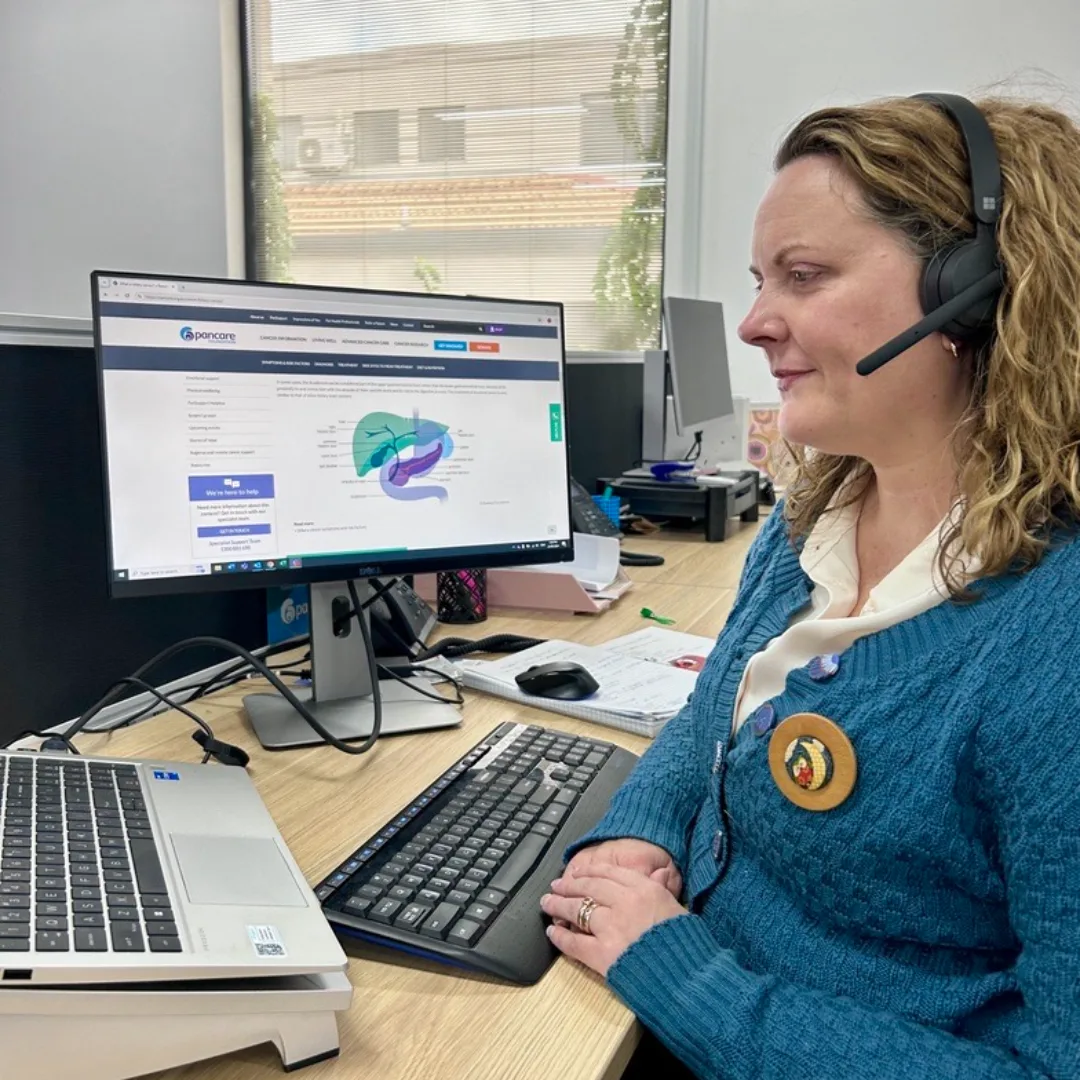Treating stomach cancer
Finding out you need treatment for stomach cancer brings many questions. What will treatment involve? How will it affect my daily life? What can I expect afterwards?
Your healthcare team will work with you to create a treatment plan tailored to your situation. This depends on factors like where in your stomach the cancer is located, whether it has spread beyond the stomach wall, your general fitness, and most importantly, your own goals and preferences.
This section explains the treatment options available for stomach cancer and helps you understand what each involves.
Treatment options for stomach cancer
Treatment goals
Treatment for stomach cancer depends on several factors, including the stage of your cancer, where it's located, your overall health, and your preferences.
When discussing treatment, your doctor will explain what the treatment aims to achieve. Understanding this intent helps you make informed decisions about your care.
Treatment for stomach cancer generally has one of three goals:
1. To cure the cancer
When stomach cancer is detected early and hasn't spread, treatment aims to remove all cancer from your body. This typically involves surgery to remove the affected part or all of your stomach, often combined with chemotherapy before or after the operation to improve outcomes.
Success rates are highest when cancer is confined to the stomach wall and nearby lymph nodes.
2. To control cancer growth and help you live longer
For cancers that have spread beyond the stomach or involve major blood vessels, treatment focuses on slowing cancer growth and maintaining quality of life for as long as possible.
This usually involves chemotherapy, sometimes with immunotherapy or targeted therapies, and may include radiotherapy for specific situations.
While these treatments won't cure the cancer, they can significantly extend life and reduce symptoms.
3. To manage symptoms and improve comfort
Some people choose treatment focused on maintaining comfort and quality of life. This might involve procedures to keep the digestive tract open and medicines to control symptoms.
This approach is called supportive or palliative care. It can be chosen at any stage and doesn't mean giving up, it means prioritising what matters most to you.
Common treatments
There are different ways to treat stomach cancer. Most people have more than one treatment. Your doctor will choose the best plan for you, based on your health and the type of cancer you have.
- Surgery is often the main treatment for stomach cancer. The surgeon may remove part of your stomach or sometimes the whole stomach. They also take out nearby lymph nodes to stop the cancer from spreading. It can take a few months to get better after surgery, and you may need to eat smaller meals more often.
- Chemotherapy uses special medicines to kill cancer cells. You might get these medicines through a drip or as tablets. They can be given before surgery to shrink the cancer, after surgery to kill any leftover cancer cells, or on their own if surgery isn’t possible.
- Targeted therapy is a newer treatment that helps your body’s own immune system fight the cancer. It may be used together with chemotherapy for some types of stomach cancer.
- works on specific changes inside cancer cells. Your tumour may be tested to see if this type of treatment could help you.
- Immunotherapy is a newer treatment that helps your body’s own immune system fight the cancer. It may be used together with chemotherapy for some types of stomach cancer.
- Radiation therapy also called radiotherapy) uses strong X-ray beams to damage cancer cells. It’s not used as often for stomach cancer, but sometimes it’s given with chemotherapy or to help ease symptoms.
- Clinical trials test new treatments to see if they work better than current ones. Joining a trial can give you access to new medicines and extra care from your health team.
Getting ready for treatment (prehabilitation)
Getting ready for treatment means helping your body and mind be as strong as possible before you start. It’s like training for a big event — the better prepared you are, the better you’ll cope.
People who prepare often recover faster, have fewer problems after treatment, and feel better overall.
Here are some ways to get ready :
- Move your body: Try to be active in ways that feel safe for you. Even short walks each day can help. An exercise expert (called an exercise physiologist) can make a plan that suits your fitness level.
- Eat well: A dietitian can help you make sure your body has the energy and nutrients it needs. You might need smaller meals more often or use supplements if eating is hard.
- Healthy habits: If you smoke, try to quit. Cutting down on alcohol also helps your body heal and makes treatment easier.
- Look after your mind: It’s normal to feel worried or scared. Talking to a counsellor, practising mindfulness, or learning ways to relax can help you feel calmer.
Your healthcare team can connect you with people who can help with each part of your plan. The most important thing is to start as soon as you can after being diagnosed.
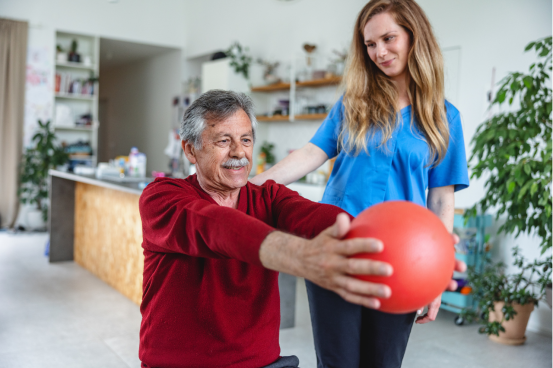
Your treatment team
Stomach cancer requires expertise from multiple specialists working together. You'll be cared for by a multidisciplinary team of professionals from different fields who meet regularly to discuss your case and coordinate your care.
Your main doctor
One doctor takes responsibility for coordinating your treatment. Depending on your situation, this might be:
- a surgeon if you're having an operation to remove the cancer
- a medical oncologist if chemotherapy is your main treatment
- a gastroenterologist who may have diagnosed your cancer through endoscopy
This doctor acts as your main point of contact and ensures all aspects of your care work together smoothly.
The multidisciplinary team
The rest of your multidisciplinary team will be made up of a mix of medical specialists, allied health professionals and supportive care professionals.
Each team member brings special skills to make sure all parts of your care are looked after. They meet regularly to talk about your case and agree on the best treatment approach.
The make-up of this multidisciplinary team may change at different stages of your treatment, but may include:
| Medical specialists | Allied health professionals | Supportive care professionals |
|
|
|
Making treatment decisons
Choosing how to approach your stomach cancer treatment is deeply personal. There's rarely one ‘right’ answer. Instead, the best choice balances medical recommendations with your own values, priorities and circumstances.
Your healthcare team provides expert advice, but ultimately you decide what treatment aligns with your goals.
Getting the information you need
To make an informed decision, it helps to know as much as you can about your treatment choices. Your treatment team will explain:
- the different treatment options available to you
- the goals of each treatment (for example, cure, control, or symptom relief)
- the benefits and risks of each option
- possible side effects and how they might affect you
- what treatment involves, including how long it takes, where it happens, and how often
- how it might affect your daily life.
Things to think about
Everyone’s situation is different. When making treatment decisions, you might want to think about:
- your personal goals and what matters most to you
- your overall health and how fit you feel
- the side effects and how they could affect your quality of life
- practical issues such as travel, time off work, or caring for family
- your own values, beliefs and preferences.
Questions to ask
It can help to write down your questions before appointments. You might like to ask:
- Based on my specific cancer, what treatment gives me the best chance of long-term survival?
- If surgery is recommended, how much of my stomach will be removed? How will this affect eating and digestion?
- What's the typical recovery time for each treatment option?
- How will treatment impact my ability to work, care for family, or maintain other responsibilities?
- What happens if I don't have treatment, or if I delay treatment?
- Are there clinical trials I should consider?
- What supportive care is available to manage side effects?
- Can I get a second opinion?
- What are the costs involved, and what financial assistance is available?
Taking your time
While stomach cancer requires prompt attention, you typically have time to:
- absorb information and ask follow-up questions
- discuss options with family or trusted friends
- seek a second opinion if desired
- research and reflect on what feels right for you
Your team will indicate if any decision needs urgency. Otherwise, taking days or even a couple of weeks to consider major treatment decisions is reasonable and expected.
Surgery for stomach cancer
Surgery gives the best chance of curing stomach cancer. But not everyone can have surgery. It depends on where the cancer is, whether it has spread, and how healthy you are.
Surgery for stomach cancer is a big operation that needs a very skilled surgeon and careful recovery afterward. Knowing what will happen before, during and after surgery can help you feel more ready .
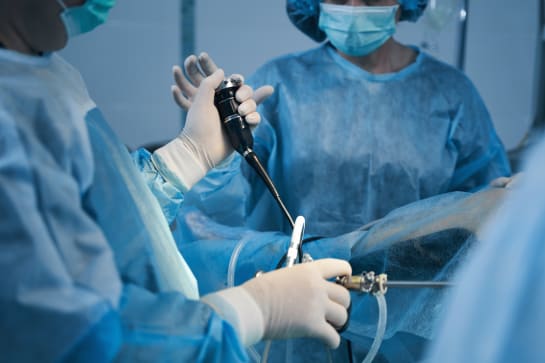
Is surgery an option for me?
Your surgeon will consider several things when recommending surgery, including:
- whether cancer remains confined to the stomach and nearby lymph nodes
- whether the cancer is near or around any major blood vessels
- your general health and fitness to have surgery
- any other health conditions that increase surgical risk.
Doctors use certain words to describe whether surgery is possible:
- Resectable (operable): The cancer can be removed with surgery.
- Borderline resectable: Surgery might be possible after chemotherapy to shrink the tumour.
- Locally advanced or metastatic: The cancer has spread too far, so surgery isn’t an option.
Types of surgery
The type of surgery you have depends on where the cancer is in your stomach and how far it has spread. Your surgeon will choose the operation that gives you the best chance of recovery.
Endoscopic resection
If the cancer is very small and found early, it might be possible to remove it using an endoscope. This is a thin, flexible tube that goes through your mouth into your stomach.
This type of surgery doesn’t need any cuts on the outside of your body, so recovery is usually faster. However, only a small number of people can have this operation because most stomach cancers are found later. Your doctor will look at your test results to see if this treatment is right for you.
Partial (subtotal) gastrectomy
If the cancer is in the lower part of your stomach, the surgeon may remove that section and keep the top part. During the operation, they also remove:
- a layer of fat that covers your organs (called the omentum)
- nearby lymph nodes to check for cancer cells
- sometimes a small part of another organ if the cancer has spread into it.
The rest of your stomach is then joined to your small intestine, so food can still pass through your body.
You’ll usually stay in hospital for about 5 to 10 days and need a few months to get your strength back. Because your stomach will be smaller, you’ll need to eat smaller meals more often.
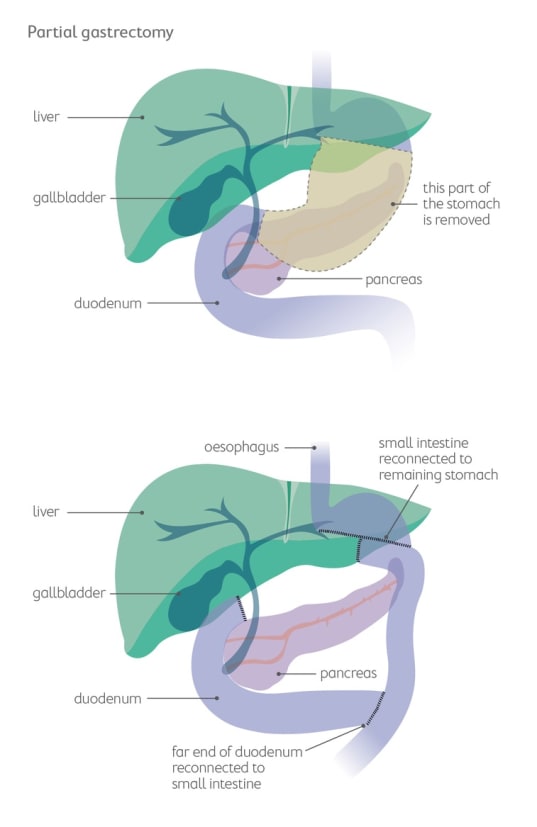
Total gastrectomy
If the cancer is in the upper part of your stomach or has spread throughout it, the surgeon may need to remove the whole stomach. After this, your oesophagus (food pipe) is connected directly to your small intestine. A small pouch is made to help hold food.
Living without a stomach means making big changes to how you eat. You will need to:
- eat tiny meals many times a day
- take vitamin B12, iron, and other supplements
- learn how to manage things like reflux or food moving too quickly into your intestines (called dumping syndrome).
Even though this sounds like a lot, many people adjust well and live full lives after surgery. Your dietitian will help you learn how to eat and stay healthy.
You’ll usually stay in hospital for 5 to 10 days, then spend a few months recovering at home. Regular check-ups with your surgical team and dietitian are very important.
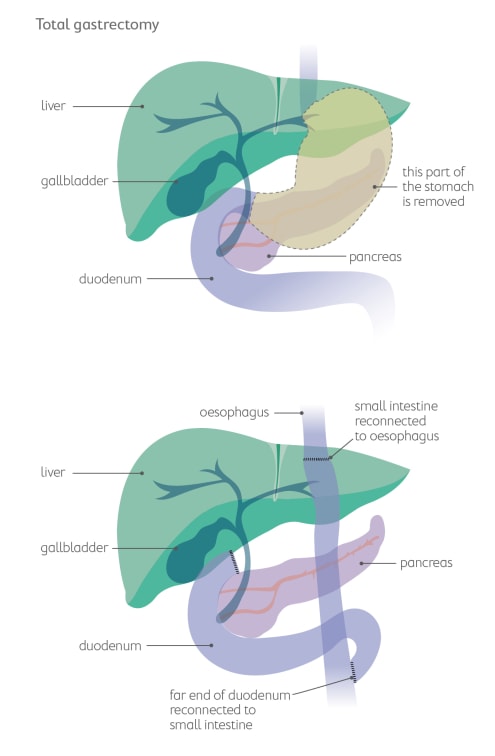
When the cancer can’t be removed with surgery
If the cancer can’t be removed with surgery, other procedures can significantly improve your quality of life by maintaining your ability to eat and drink comfortably.
Stent placement
As stomach cancer grows, it may narrow or block the passage of food, causing difficulty swallowing, vomiting, and inability to maintain nutrition.
A stent is a small expandable mesh tube. It can be placed through the narrowed area during an endoscopy procedure (while you're sedated). Once in place, it opens up the passage, allowing food to pass through more easily.
Bypass surgery
When tumour blockage isn't suitable for stenting, surgeons can create a new connection that allows food to bypass the blocked area. This involves joining part of your stomach above the blockage directly to your small intestine.
Your surgeon will discuss whether this option suits your situation.
What to expect when having surgery
Before surgery
- You’ll have several tests to check you’re ready for the operation.
- You’ll meet your surgical team to talk about the benefits, risks and what recovery will look like.
- You might start prehabilitation to improve your fitness and nutritional state.
During your hospital stay
Most people stay in hospital for 1–2 weeks after surgery for stomach cancer.
- You may start your recovery in an intensive care or high-dependency unit.
- You’ll slowly begin to eat and drink again. You might start with a feeding tube before moving onto liquids and then soft foods.
- Your team will help manage pain and watch for any problems.
Recovery at home
- Healing after stomach surgery takes time and patience. You’ll need to give your body a chance to rest and get stronger.
- It’s normal to feel tired for many weeks or even months. Try to move a little more each day, but listen to your body. You’ll have some good days and some harder ones.
- Your digestion will also take time to adjust. You’ll need to learn what foods feel comfortable and how much you can eat at once. Some common things you might notice include:
- Dumping syndrome: When food moves too quickly into your intestines, you might feel cramps, diarrhoea, sweating, or dizziness. To help, avoid sugary foods, eat some protein with each meal, and try not to drink fluids at the same time as eating.
- Reflux: Sometimes acid or bile can flow back up and cause a burning feeling. Sitting upright after meals and taking medicine from your doctor can make this better.
- Feeling full quickly: You may feel full after only a few bites. Eating small meals more often during the day can help.
- Nutrient problems: Your body may not absorb everything it needs. You might need enzyme capsules to help with digestion and vitamin supplements like B12 or iron.
- It can also take time to get used to the changes in your body and how you eat. It’s normal to feel frustrated, sad, or worried. Talking with a counsellor or joining a support group can really help. You’ll meet others who understand what you’re going through.
Getting support
Recovery from stomach surgery isn't something to navigate alone. Lean on:
- your surgical team for medical concerns
- a specialist dietitian for nutritional guidance
- family and friends for practical help and companionship
- Pancare's Support service to connect with others who've had similar surgeries .
Remember, recovery takes time. Most people gradually find their new normal, though it may look different from life before surgery.
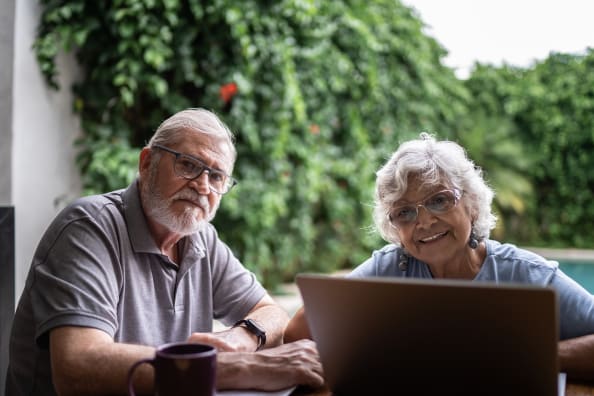
Chemotherapy for stomach cancer
Chemotherapy uses special medicines to kill cancer cells or stop them from growing.
It is one of the main treatments for stomach cancer.
The doctor in charge of your chemotherapy is called a medical oncologist.
Will I have chemotherapy?
Your oncologist may recommend chemotherapy:
- before surgery (called neoadjuvant therapy) to shrink the tumour and make surgery easier.
- after surgery (called adjuvant therapy) to lower the chance of the cancer coming back.
- as your main treatment when surgery isn’t possible.
Types of chemotherapy
Chemotherapy can be given in two main ways .
- Through a drip (IV chemotherapy). The medicine goes into a vein through a drip, usually in a hospital or cancer clinic. Each session can take a few hours, depending on your treatment plan.
- As tablets or capsules (oral chemotherapy). Some chemotherapy medicines come as tablets or capsules you take at home. Your oncologist will explain exactly when and how to take them.
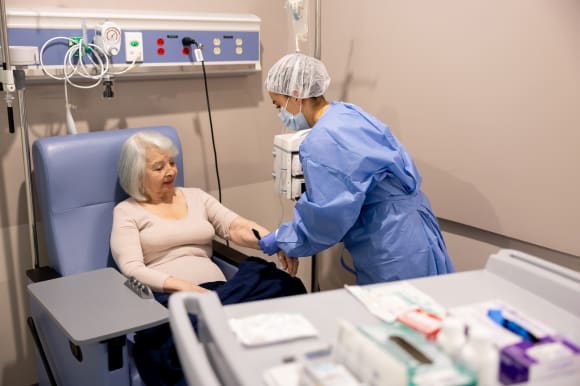
What to expect during chemotherapy
Your chemotherapy plan
Your oncologist will design a plan based on:
- the stage of your cancer
- your overall health
- whether you’ve had surgery
- previous treatments
- clinical trials that might be suitable.
Most plans use a combination of drugs that work together to fight cancer cells.
Chemotherapy is usually given in cycles. This means you’ll have a period of treatment followed by a rest period so your body can recover.
A full course of chemotherapy often lasts several months. Your care team will explain the exact schedule for you.
Access devices
If you’re having IV chemotherapy through a drip, your doctor may recommend a device to make treatment easier. This might be:
- a PICC line: a soft tube placed in a vein in your arm and threaded near your heart. It stays in during your treatment so you don’t need needles each time.
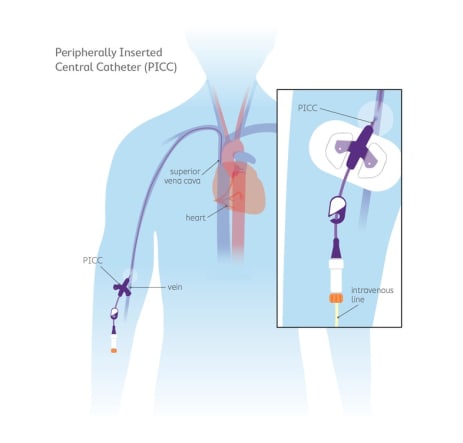
- a Port (Port-a-Cath): a small device placed under the skin of your chest that connects to a vein. It’s accessed with a special needle and can stay in for months.
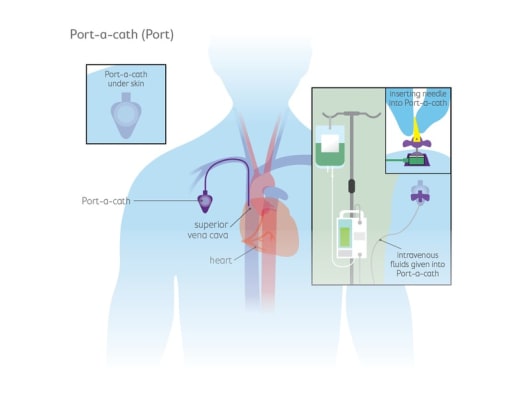
These devices help protect your veins and make treatment more comfortable.
Monitoring during treatment
You’ll have regular check-ups to make sure chemotherapy is working safely.
These may include:
- blood tests to check your blood counts and organ function
- scans to see how the cancer is responding
- check-ins to talk about how you’re feeling and any side effects
Side effects and how to manage them
Chemotherapy can affect healthy cells too, which causes side effects. Not everyone gets the same effects, and most can be managed well.
Common side effects include:
- feeling tired or weak
- feeling sick (nausea) or vomiting
- loss of appetite or changes in taste
- hair thinning or loss
- diarrhoea or constipation
- mouth sores
- numbness or tingling in your hands and feet
- higher risk of infections.
Your team can help by:
- prescribing anti-sickness or infection-preventing medicines
- adjusting your chemotherapy dose if needed
- providing nutrition and pain-management advice
- offering emotional and practical support.
Always tell your nurse or doctor about any side effects. There are often ways to make you feel more comfortable.
Getting support
Chemotherapy can be physically and emotionally tough. You don’t have to go through it alone.
Your care team, a dietitian, or Pancare's Support service can help you manage side effects, plan meals, and find emotional support.
Targeted therapy
Targeted therapy is a type of cancer treatment that uses special medicines to attack cancer cells while causing less harm to healthy cells. These medicines work by blocking or changing the signals that help cancer cells grow and spread.
Will I have targeted therapy?
Not all stomach cancers can be treated with targeted therapy. The tumour must have certain features that can be targeted. Your doctor will test your cancer tissue to see if these medicines might help you.
Types of targeted therapy
Trastuzumab
Some stomach cancers have very high levels of a protein called HER2. This can make the cancer cells grow too fast.
If your cancer is HER2-positive, you may be given a medicine called trastuzumab. It works by attaching to the HER2 protein on the cancer cells and blocking their growth.
Trastuzumab is given with chemotherapy every 2–3 weeks through a drip into a vein. It can help slow or stop the cancer from growing. Some people may have side effects such as tiredness, fever, nausea or heart problems. Your doctor will monitor you closely.
Other targeted therapies
Another medicine, called ramucirumab, helps by cutting off the blood supply that tumours need to grow. It can be used for advanced stomach cancer that has not responded to chemotherapy. Ramucirumab may cause side effects such as stomach pain, diarrhoea or high blood pressure.
Testing and personalised medicine
Before you can have targeted therapy, a sample of tumour will be tested in a laboratory. This testing looks for certain genes or proteins that the medicine can target.
This is part of an approach called personalised medicine, where treatment is chosen to match your individual type of cancer.
Because everyone’s cancer is different, these tests help doctors find the treatments that are most likely to work for you.
Your oncologist will explain which targeted therapies are available in Australia and whether they are covered by the Pharmaceutical Benefits Scheme (PBS ).

Immunotherapy
Immunotherapy is a treatment that helps your body’s own immune system fight cancer. Normally, your immune system protects you from things like germs and damaged cells. But sometimes, cancer cells hide from the immune system.
Immunotherapy medicines help ‘unblock’ your immune system so it can see and attack the cancer cells.
Will I have immunotherapy?
For some people with advanced stomach cancer, immunotherapy is used along with chemotherapy.
Types of immunotherapy
A medicine called nivolumab may be used when the cancer has high levels of a protein called PD-L1, or when chemotherapy has stopped working. It can also be used if the tumour has a special marker called MSI (microsatellite instability).
Immunotherapy is usually given through a drip into your vein every few weeks. It doesn’t work for everyone, but for some people it can help control the cancer and improve how they feel.
Possible side effects
Immunotherapy can cause the immune system to become too active, which might lead to redness, swelling, or pain in different parts of the body. Common side effects include:
- tiredness (fatigue)
- skin rash
- diarrhoea
- cough
In rare cases, it can cause more serious problems if the immune system attacks healthy organs. Your doctors will watch you closely and treat any side effects quickly. Always tell your care team straight away if you feel unwell, even if it seems minor.
Radiotherapy for stomach cancer
Radiotherapy (also called radiation therapy) uses strong X-rays to destroy cancer cells.
In stomach cancer, radiotherapy is used to control symptoms like pain, trouble swallowing and bleeding.
Will I have radiotherapy?
Your doctor may suggest radiotherapy to help ease pain or other symptoms.
How radiotherapy works
Radiotherapy is given by a machine that directs beams of radiation at the cancer from outside your body.
You won’t see or feel the radiation, but it works inside your body to damage the DNA of cancer cells so they can’t keep growing.
Radiotherapy might be given in combination with a small dose of chemotherapy. This is called chemoradiation. The chemotherapy makes cancer cells more sensitive to radiation, helping the treatment work better.
Your oncologist will discuss whether this approach is suitable for you.
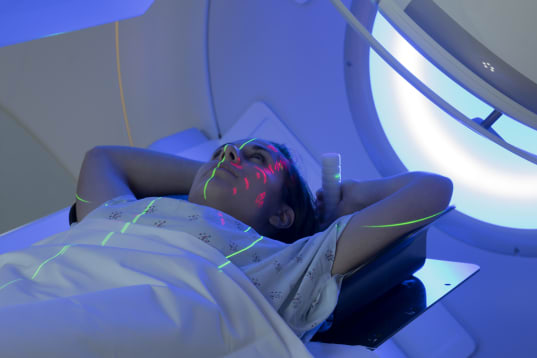
What to expect during radiotherapy
Before treatment
- You’ll have a planning session to prepare for radiotherapy.
- You might have a CT scan to help your team map out the exact treatment area.
- Small dots or tattoos may be placed on your skin so the radiation can be aimed accurately each time.
- Your team will explain how many treatments you’ll need and what to expect.
During treatment
- Treatment usually happens once a day, Monday to Friday.
- Each visit lasts about 15–30 minutes, but the radiation itself takes only a few minutes.
- You’ll lie still on a treatment bed while the machine moves around you.
- You won’t feel the radiation, and you’ll be able to go home afterwards.
- Most people have treatment for several weeks.
Side effects and how to manage them
Side effects usually appear slowly during treatment and improve a few weeks after it finishes. Everyone reacts differently, but common effects include:
- feeling tired
- skin redness or irritation in the treated area
- nausea or loss of appetite
- diarrhoea or softer bowel motions
- discomfort or a warm feeling in the abdomen
Your radiation oncology team will help you manage side effects. They can give advice about:
- gentle skin care
- anti-nausea or diarrhoea medicines
- eating well and maintaining energy
- when to contact your doctor if you’re worried.
Getting support
It’s normal to feel tired or emotional during treatment.
Your healthcare team can help with symptom control, nutrition, and emotional wellbeing.
You can also reach out to Pancare's Support service practical advice, counselling, and connections with others living with stomach cancer.
Clinical trials
Clinical trials are research studies that test new treatments or new ways of using existing ones. They help doctors find better and safer ways to treat, diagnose, and manage stomach cancer.
For some people, joining a clinical trial can offer access to promising new treatments and specialised care before these options become widely available.
Why consider a clinical trial
Taking part in a clinical trial can give you the chance to try a new approach that may work better than standard care. You’ll be closely monitored by expert doctors and nurses who specialise in stomach cancer.
Even if the treatment being tested doesn’t benefit you directly, your participation helps researchers learn more about the disease and improve care for future patients. Many people find this sense of contributing to progress reassuring and empowering.
What kinds of trials exist
There are many different types of clinical trials.
Some test new chemotherapy drugs or combinations, while others explore targeted therapies that act on specific changes in cancer cells.
Researchers are also studying new ways to use immunotherapy to help the body’s own immune system fight cancer.
Other trials look at surgical techniques, how to better manage symptoms or side effects, or how to detect stomach cancer earlier.
Each trial has its own entry requirements, called eligibility criteria. These might include the type and stage of your cancer, your previous treatments, your general health, and sometimes genetic features found in your tumour.
Your healthcare team can explain which kinds of studies are currently running and whether one may be right for you.
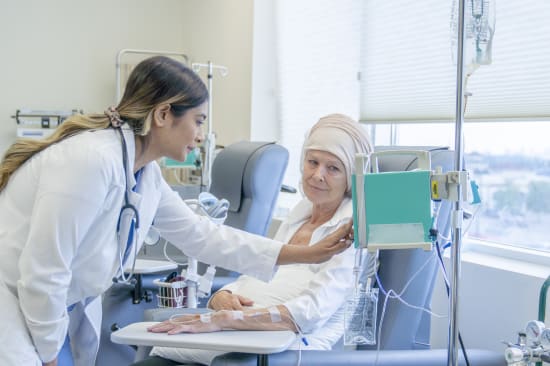
Finding clinical trials
If you’d like to explore current stomach cancer trials, speak to your oncologist or visit trusted websites such as australiancancertrials.gov.au or the Australasian Gastro-Intestinal Trials Group.
You can also contact the Pancare Foundation for guidance and information about studies in Australia.
Complementary and alternative therapies
Many people with stomach cancer look for ways to feel better and support their wellbeing during treatment.
Complementary and alternative therapies are two types of approaches people sometimes use. It’s important to understand how they differ, and how they can safely fit into your care.
Understanding the difference
- Complementary therapies are used alongside standard medical treatments such as chemotherapy, surgery or radiotherapy. They aim to help you relax, manage symptoms, and improve your quality of life. Examples include meditation, yoga, massage, acupuncture, and relaxation techniques.
- Alternative therapies, on the other hand, are used instead of standard medical treatments. These approaches have not been proven to treat cancer and can sometimes be harmful or interfere with your care. For this reason, alternative therapies are not recommended as a replacement for evidence-based treatment.
Complementary therapies that may help
Some complementary therapies can be safely used to help with relaxation or symptom relief, as long as your healthcare team agrees.
- For relaxation and wellbeing: Gentle exercise, yoga, meditation, mindfulness, aromatherapy, massage (with your doctor’s approval), music therapy, and art therapy can help reduce stress and improve mood.
- For specific symptoms: Acupuncture and acupressure wristbands may help reduce nausea or pain. Some people find ginger tea or tablets helpful for nausea. Simple breathing and relaxation exercises can ease anxiety and support sleep.
Dietary supplements
It’s common to wonder whether vitamins, minerals, or herbal products could help.
Some may be safe, but others can interfere with chemotherapy or other cancer treatments.
Always tell your healthcare team about any supplements you’re taking or thinking about taking. They can check for possible interactions and advise what’s safe.
Remember:
- High doses of some vitamins can be harmful.
- ‘Natural’ doesn’t always mean safe.
- Many products make claims that are not supported by science.
If in doubt, ask your doctor, pharmacist or dietitian before starting anything new.
Making informed choices
Before starting any new therapy, take time to check that it’s safe and worthwhile.
Talk to your healthcare team. They need to know everything you’re using. You can also ask:
- Is this safe to use with my cancer treatment?
- What are the possible risks or side effects?
- What evidence supports this therapy?
- How much will it cost and how often would I need it?
Follow-up care
After your initial treatment is complete, you'll enter a phase of follow-up care. This is an important part of your cancer journey.
Follow-up care involves:
- regular check-ups with your healthcare team
- watching for signs of cancer coming back
- managing ongoing side effects
- supporting your recovery and wellbeing
- coordinating care between specialists and your GP.
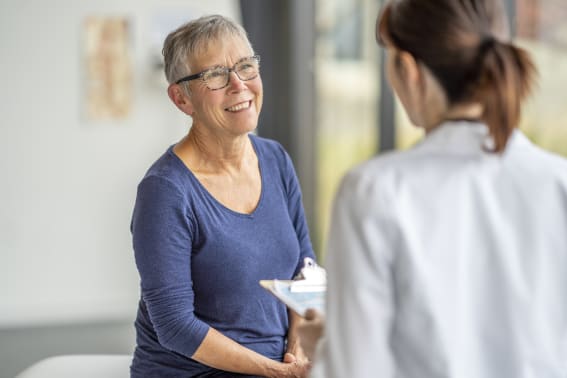
Your follow-up care plan
Every person’s recovery is different. Your healthcare team will create a personalised follow-up plan that explains:
- Who your main contact person is (such as a nurse or specialist)
- How often you’ll need check-ups and who you’ll see
- Which tests you may need and how often they’ll be done
- What to expect at each visit
You may have blood tests and CT or MRI scans from time to time to check for any changes.
These tests help your doctors see how you’re healing and detect any possible signs of the cancer returning early.
If you’ve had part of your stomach removed, you may have a regular endoscopy to check that the remaining stomach and connections are working well.
Managing ongoing issues
Some people continue to experience side effects after treatment, such as fatigue, digestive changes, or problems with appetite.
Your care team will support you to manage these issues and maintain your strength.
What to watch for
Your doctor will tell you about symptoms that may need to be checked quickly.
These might include:
- new or worsening pain in your tummy or back
- unexpected weight loss or loss of appetite
- trouble swallowing
- persistent vomiting that stops you from eating
- Black or bloody poos
- Yellowing in your skin or eyes (jaundice)
- new lumps, swelling or discomfort anywhere in your body.
If you notice any of these symptoms, or anything that worries you, contact your healthcare team or GP as soon as possible.
Looking after yourself
Recovery takes time, both physically and emotionally. Keep communicating with your care team and let them know how you’re feeling.
Gentle physical activity, a balanced diet, rest, and emotional support from friends, family, or a counsellor can all make a big difference.
If you’d like extra support, Pancare’s Support service can connect you with nurses, counsellors, dietitians and others who understand what you’re going through .

Want to talk?
Speak to an upper GI cancer nurse or counsellor, we're here to provide you with the support you need. Support available to anyone impacted by upper gastrointestinal (GI) cancer. Monday to Friday, 9am-5pm.
